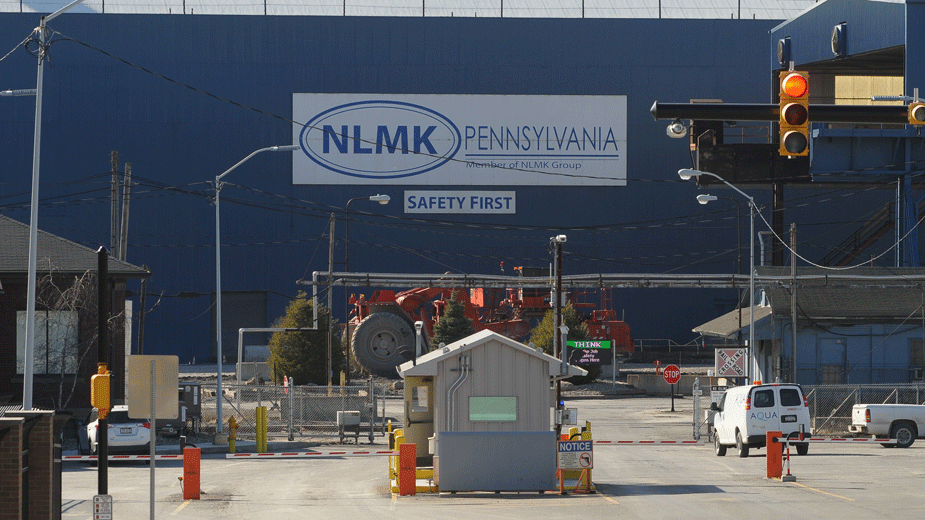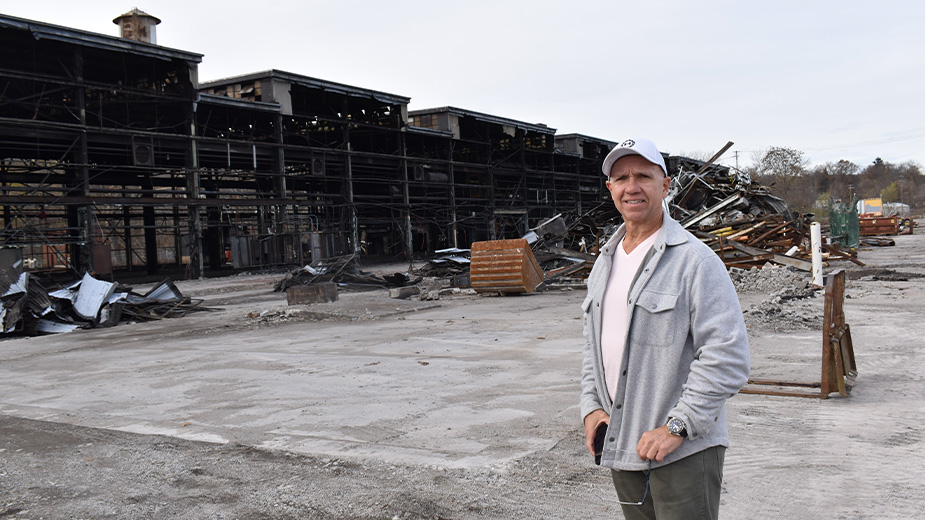Layoffs at NLMK Raise Concerns, Frustrations
YOUNGSTOWN, Ohio — When it comes to addressing the impact of tariffs on foreign steel, Randy Seitz says he’s at his wits’ end.
The president and CEO of Penn-Northwest Development Corp. says the organization has been working with elected officials at the state and federal levels to alleviate the pressure placed on NLMK Pennsylvania, Farrell, Pa., by the tariffs imposed by the Trump administration. On Tuesday, it was reported by the Sharon Herald that NLMK had laid off up to 100 workers and eliminated another 35 salaried positions as a result of the tariffs.
“It’s getting increasingly more frustrating,” Seitz says. “Almost a year and a half ago, we began banging the pots and pans in Harrisburg, warning that this was going to happen. But we got little to no results out of the governor’s office.”
Efforts included Seitz personally writing letters to Trump and working with elected officials to exclude NLMK from having to pay the tariffs, he says. In April, petitions filed a year ago by NLMK USA requesting exclusions from the policy were denied by the U.S. Department of Commerce.
In March, U.S. Sen. Pat Toomey, R-Pa., and U.S. Rep. Mike Kelly, R-16 Pa., urged U.S. Secretary of Commerce Wilbur Ross to consider the petition that would have excluded NLMK from paying the 25% tariff on imported steel. NLMK Pennsylvania is a Russian-owned steel mill that imports steel slab to process for its customers in the U.S.
Officials at NLMK did not respond to requests for comment.
“NLMK was instrumental in putting steelworkers in Sharon, Pa., back to work after the Sharon Steel mill closed,” Kelly said in an email statement responding to the layoffs. “For more than a year, I worked with NLMK on its application for exclusions from the Section 232 tariffs. I advocated the company’s requests for relief directly to the president and high-level commerce officials because I believe they make a good case for exclusion. Unfortunately, the administration does not agree and denied the petitions.”
In their letter to Ross, Toomey and Kelly wrote that tariffs have cost NLMK $106.7 million since March 2018.
As of Setiz’s last conversation with NLMK Pennsylvania President Bob Miller a few months ago, that number has increased to some $150 million, he says.
“If something is not done, these jobs are going to go away,” Seitz says. “This is the start.”
Such a loss would deliver an economic blow to Mercer County, he says. With the employees making about $100,000 annually on average, take those jobs out of the community “and you are going to see our gross area product implode,” he says. It would also impact the businesses that serve NLMK as well as the businesses that benefit from having those wages circulate through the community, he adds.
“That plant represents about a third of our general fund budget, between property and income taxes,” says Michael Ceci, Farrell city manager. “They’re vital to the services we provide to the residents and businesses.”
The city of Farrell manages a general fund of about $3 million, he notes. Just one layoff can have an impact to the area, but laying off 100 workers out of the roughly 600 at the plant “is going to be a hit” to property taxes and income tax collections, he says.
For the city, that means tightening its belt and holding off on purchases it would otherwise make, he says.
Ceci expects the loss would slow down the gains the community has made over the years, he adds. In August, UPMC Horizon opened an expanded cancer center in Farrell, and in October, FarmaceuticalRX launched a $14 million marijuana research campus there.
Uncertainty in the market since Trump effected the 25% steel tariff and the 10% aluminum tariff in May 2018 has already stayed NLMK’s hand. In March, The Business Journal reported NLMK placed on hold $600 million in new investments, including a $100 million investment into the Farrell works.
In December 2016, the company announced plans for an $80 million upgrade to the Farrell plant that would see construction of a new walking-beam reheating furnace there. The new equipment would help streamline the slab-heating process and replace three outdated pusher-type furnaces.
But Ceci is hopeful things will be worked out before they get worse.
“My fingers are crossed that this gets figured out,” he says. “I have faith in that operation. I have faith in those employees and that management. They do a good job and they’ve been able to survive, even if just barely, with the tariffs.”
With NLMK’s petition being denied and the Trump administration this week enacting additional tariffs on Brazil and Argentina, Penn-Northwest’s Seitz’ forecast is grim.
“We’ve done all the right things that a community should do to keep a company like NLMK alive. And we started early enough where all the elected officials would have time to dot the i’s and cross the t’s to ensure this doesn’t happen,” Seitz says. “Anything short of getting the waiver is not going to help NLMK.”
NLMK operates mills in Pennsylvania and Indiana, and produces steel from 20- to 25-ton slabs shipped from overseas to the Farrell plant. About 95% of the steel slab is from its parent company, Novolipetsk Steel in Russia. The slabs are fed into the Farrell plant’s hot strip mill and processed into coil and then sold to customers.
The slabs are available in limited quantities from domestic producers. Between 2016 and 2017, NLMK was able to secure just 2% of its slab domestically.
Because not enough slabs are produced in the U.S., the company also buys some of its steel from companies not affected by the tariffs, including those in Canada, Mexico and Brazil. However, on Monday, Trump tweeted that tariffs on Argentina and Brazil were “effective immediately,” claiming the countries had devalued their currencies. Until that point, the countries had been exempt.
“Brazil and Argentina have been presiding over a massive devaluation of their currencies. which is not good for our farmers,” Trump tweeted. “Therefore, effective immediately, I will restore the tariffs on all steel and aluminum that is shipped into the U.S. from those countries.”
To enact the tariffs, Trump restored Section 232 of the Trade Expansion Act of 1962, which allows the president to impose tariffs on the grounds of national security. During his regular conference call with reporters, U.S. Sen. Rob Portman, R-Ohio, says he was not supportive of the way the Trump administration had been using Section 232.
“I think it’s a mistake,” Portman says. “It will end up with a situation where other countries will do that to us more.”
With regard to the tariffs on Argentina and Brazil, Kelly responded via email that his priority is to “protect American workers and farmers,” he says.
“If other countries are harming our economy and defense industrial base by manipulating their currencies, that is a problem and we should address it,” Kelly says.
Officials at the local and state level don’t disagree. Seitz supports the idea of using a tariff to require a company to pay more if they buy from foreign suppliers to improve their profit margin, he says. But if a company can’t buy the product domestically because it doesn’t exist, “why punish them?” he adds.
“It’s an unfair competition that’s going to end up closing these doors,” Seitz says.
State Rep. Mark Longietti, D-7 Pa., says he’s done everything he can do at his level to assist NLMK, including corresponding with U.S. Secretary of Commerce Ross, the Office of U.S. Trade Representative Robert Lighthizer, and congressmen and senators representing the commonwealth. NLMK has “made a strong case” that it’s not able to purchase the steel it needs domestically, and the impact of the Section 232 tariffs on the company “is not a good policy outcome,” he says.
“It grieves me personally to see 100 people being laid off as well as 35 salaried workers,” Longietti says. “This is not the policy outcome that anybody wants to see; American workers being laid off.”
Copyright 2024 The Business Journal, Youngstown, Ohio.



